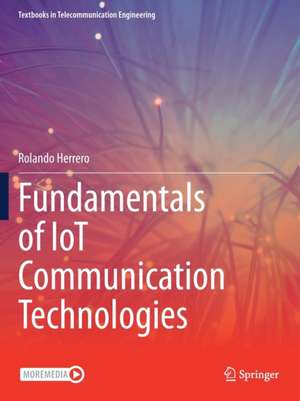Fundamentals of IoT Communication Technologies: Textbooks in Telecommunication Engineering
Autor Rolando Herreroen Limba Engleză Paperback – 25 iun 2022
| Toate formatele și edițiile | Preț | Express |
|---|---|---|
| Paperback (1) | 429.83 lei 6-8 săpt. | |
| Springer International Publishing – 25 iun 2022 | 429.83 lei 6-8 săpt. | |
| Hardback (1) | 476.90 lei 39-44 zile | |
| Springer International Publishing – 24 iun 2021 | 476.90 lei 39-44 zile |
Preț: 429.83 lei
Nou
Puncte Express: 645
Preț estimativ în valută:
82.29€ • 85.86$ • 68.98£
82.29€ • 85.86$ • 68.98£
Carte tipărită la comandă
Livrare economică 13-27 martie
Preluare comenzi: 021 569.72.76
Specificații
ISBN-13: 9783030700829
ISBN-10: 3030700828
Pagini: 249
Ilustrații: XIX, 249 p. 330 illus., 1 illus. in color.
Dimensiuni: 210 x 279 mm
Greutate: 0.62 kg
Ediția:1st ed. 2022
Editura: Springer International Publishing
Colecția Springer
Seria Textbooks in Telecommunication Engineering
Locul publicării:Cham, Switzerland
ISBN-10: 3030700828
Pagini: 249
Ilustrații: XIX, 249 p. 330 illus., 1 illus. in color.
Dimensiuni: 210 x 279 mm
Greutate: 0.62 kg
Ediția:1st ed. 2022
Editura: Springer International Publishing
Colecția Springer
Seria Textbooks in Telecommunication Engineering
Locul publicării:Cham, Switzerland
Cuprins
Part I. Understanding IoT Communications.- Chapter 1. Introduction.- Chapter 2. Concepts of IoT Networking.- Part II. IoT Network Layers.- Chapter 3. Physical and Link Layers.- Chapter 4. Network and Transport Layers.- Chapter 5. Application Layer.- Part III. Advanced IoT Networking Topics.- Chapter 6. Resource Identification and Management.- Chapter 7. Routing on Constrained Devices.- Chapter 8. LPWAN Technologies.- Chapter 9. Thread Architecture.
Notă biografică
Rolando Herrero holds a Ph.D. degree in Electrical Engineering from Northeastern University where he specialized in communications and signal processing. He received his B.S. and M.S. degrees in Electrical Engineering from the Buenos Aires Institute of Technology (ITBA) and from the University of Maryland Baltimore County (UMBC) respectively. For over 20 years, he has been involved in several research and development positions within the telecommunication and industrial control markets specializing in media and data processing, packetization and transmission. This work has led to well over 20 patents as well as multiple conference and journal papers in areas ranging from Real Time Communications to IoT applied to UAVs. He is the founder of L7TR, a solutions company specialized in IoT communication technologies. He is also adjunct professor at Northeastern University where he lectures on IoT, signal processing and communications.
Textul de pe ultima copertă
This textbook explores all of the protocols and technologies essential to IoT communication mechanisms. Geared towards an upper-undergraduate or graduate level class, the book is presented from a perspective of the standard layered architecture with special focus on protocol interaction and functionality. The IoT protocols are presented and classified based on physical, link, network, transport and session/application layer functionality. The author also lets readers understand the impact of the IoT mechanisms on network and device performance with special emphasis on power consumption and computational complexity. Use cases – provided throughout – provide examples of IoT protocol stacks in action. The book is based on the author’s popular class “Fundamentals of IoT” at Northeastern University. The book includes examples throughout and slides for classroom use. Also included is a 'hands-on’ section where the topics discussed as theoretical content are built as stacks in the context of an IoT network emulator so readers can experiment.
- Presents a comprehensive resource of the Internet of Things and its networking and protocols, intended for classroom use;
- Discusses the main families of networking architectures that rely on the IoT protocols (i.e. LWPAN vs WPAN);
- Introduces use cases and examples that focus on protocol interaction to build network stacks in addition to a suite of classroom materials including exercises and Q&A.
Caracteristici
Presents a comprehensive resource of the Internet of Things and its networking and protocols, intended for classroom use Presents and discusses the main families of networking architectures that rely on the IoT protocols (i.e. LWPAN vs WPAN) Introduces use cases and examples that focus on protocol interaction to build network stacks in addition to a suite of classroom materials including exercises and Q&A Request lecturer material: sn.pub/lecturer-material













